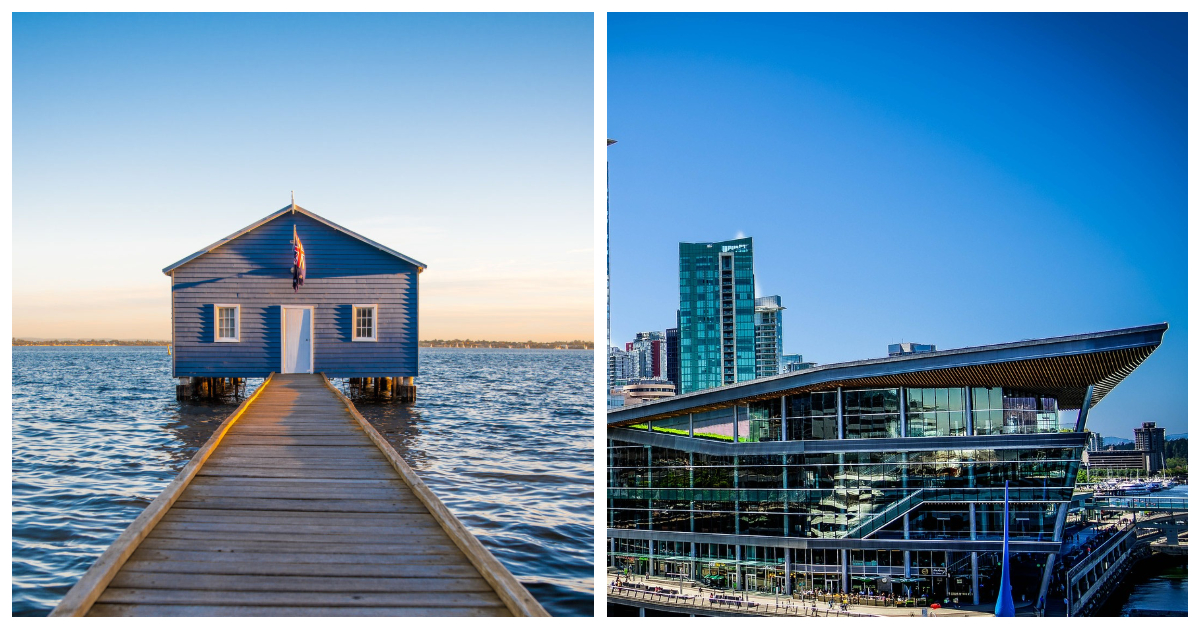Travelling across Canada from East to West (or vice-versa) is a dream trip for many Canadians, as well as those visiting Canada from abroad. Who can blame them? Canada is drop-dead gorgeous, has delicious food, friendly locals, and an interesting mix of cultures.
One of the best ways to immerse yourself into all things Canadian is to travel from coast to coast – with detours up north when possible (we highly recommend a visit to Churchill, Manitoba to see the beluga whales in July and August). The question is (and we get this one a lot), how to travel across Canada by train and car?
It’s a great question, which is why we are writing this guide ;).
The distance from Newfoundland to Vancouver is, roughly, 6,818 kms (80 hrs + time on the ferry from Newfoundland to Nova Scotia). About 5 days of driving if you only plan to stop for gas, bathroom breaks and sleeping.
Which would be silly if this is your first trip to Canada as you wouldn’t have a chance to enjoy the communities (and yummy eats) along the way. And let’s be honest, that is one of the reasons you are travelling across Canada in the first place, right?!
ROUTES
There are a couple of ways to travel from Newfoundland to Vancouver.
- DRIVE
- DRIVING & TAKING THE TRAIN
DRIVING FROM NEWFOUNDLAND TO VANCOUVER

If you’re planning an epic trip across Canada with a lot of stops along the way, then driving from Newfoundland to Vancouver may be an ideal choice. Of course, the Trans-Canada Highway is the best way to go (HWY 1).
If you’re Canadian and planning to use your own vehicle, you’ll want to plan a round-trip adventure that offers plenty of variety in terms of scenery. If, however, you’re travelling to Canada from abroad, driving across Canada can be more expensive.
Doing a one-way car rental from Newfoundland to Vancouver can be done, but you’re looking at a minimum cost of $4,200 CAD for a 7-day rental, which doesn’t leave much room for stopping along the way. Of course, you could always buy a used car in good condition in Newfoundland and sell it once you get to Vancouver. Visit the Enterprise car rental website for pricing on one-way rentals.
Another thing to consider when driving across Canada is extra fees like the ferry from Newfoundland to Nova Scotia (minimum $165 CAD one-way).
If you’re planning to drive the whole route, then you’ll want to read about The Best Hostels in Canada as well as 10 Places To Stop On Your Next Canadian Road Trip.
A MIXTURE OF DRIVING & TAKING THE TRAIN

An alternative to driving from Newfoundland to Vancouver is to drive through Newfoundland, take the ferry across to Nova Scotia (or fly from St. John’s to Halifax) and then travel by train with VIA Rail from Halifax to Vancouver.
This is, in my opinion, the best option (as I have done this personally, and loved it!). Newfoundland is best seen by driving around, exploring small fishing hamlets and immersing yourself in local cultures. Or, spend a few days in St. John’s then fly over to Halifax for a couple days before boarding The Ocean line with VIA Rail (which runs from Halifax to Montréal. From Montréal you’ll travel through the Québec-Windsor Corridor to Toronto where you’ll switch to The Canadian line which will take you all the way to Vancouver.
While taking the train will limit your ability to make random stops at quirky towns and roadside food huts, you will have the ability to build stops into your journey to visit some of Canada’s beautiful capital cities.
COST OF TRAVELING FROM NEWFOUNDLAND TO VANCOUVER

The costs of travelling from Newfoundland to Vancouver vary depending on the route you choose and the number of people travelling in your group, but here is an estimated summary of costs that you may incur.
DRIVING FROM NEWFOUNDLAND TO VANCOUVER
As we mentioned above, it is possible to do a one-way car rental from St. John’s, Newfoundland to Vancouver, BC through Enterprise. If you’re travelling solo, this is definitely not a budget-friendly option, however, if there are two or more people in your travelling party this could be a good option for you. Here are some of the costs you’ll encounter on your journey.
- A two-week one-way car rental will cost around $5,400 CAD in summer and around $4,700 CAD in autumn. Around $2,500 – $3,000 of the total charge is considered a ‘drop-off fee’. If you did a round-trip car rental (let’s say two weeks out and one week back) the car rental would be around $2,130 CAD in summer. That is a BIG difference!
- Insurance is something else you’ll need to consider. Before leaving home make sure your insurance will cover your car rental (your credit card may cover this as well, so double check). You can purchase insurance through the car rental company, but be prepared to pay around $25 CAD per day.
- Gas: OMG, the price of gas is at an all-time high in Canada. Be prepared to pay as much as (or more than) $1.40 CAD per litre depending on the province you’re driving through. Québec and British Columbia are typically the highest in terms of gas prices.
- Ferry from Newfoundland to Nova Scotia will cost around $117 CAD for your vehicle and $45 CAD per passenger.
- Accommodations: There are plenty of hotels along the Trans-Canada HWY 1 from Halifax to Vancouver. If you’re on a budget, most major cities have hostels (here are our favourites across Canada). Booking.com is a good resource for researching and booking hotel rooms. If you’re looking for a Canadian hotel brand, I highly recommend ALT or Le Germain Hotels. Impeccable service and insanely comfy beds. Depending on the season, hostel beds begin at $20 CAD per night and hotel rooms start at $99 CAD per night. Another option is to camp along the way or look for free sofas to crash on through Couchsurfing.
- Food: You’ll find a variety of food options in Canada. We are a multi-cultural country after all. Have fruit, water, nuts and granola bars in the car for snacks and breakfast. Then count on spending about $15 CAD for lunch and $20-$40 CAD for dinner (or more).
- Taxes: In Canada, we have both federal (GST, 5%) and provincial tax (varies). While many provinces have both taxes, some will only have federal tax. For info on taxes in each province see this article.
TRAVELLING BY CAR & TRAIN
- A one-way 7-day car rental from St. John’s to Halifax will cost around $2,600 CAD.
- Insurance is something else you’ll need to consider. Before leaving home make sure your insurance will cover your car rental (your credit card may cover this as well, so double check). You can purchase insurance through the car rental company, but be prepared to pay around $25 CAD per day.
- Gas: the current gas prices in Newfoundland are around $1.35 CAD* per litre, thankfully once you are in Nova Scotia the gas prices drop to around $1.23 CAD* per litre. *Prices are subject to change, this is a rough estimate to help you budget for your trip.
- The ferry from Newfoundland to Nova Scotia will cost around $117 CAD for your vehicle and an additional $45 CAD per passenger.
- Fly from St. John’s to Halifax: A one-way flight to Halifax will be significantly cheaper than renting a car. Fares, depending on the season, can be as low as $150 CAD per person. I recommend searching Porter, Air Canada, and WestJet to find the best fare.
- VIA Rail: We have written a handy guide on how to travel on VIA Rail here, but I’ll give a little summary as well. If you’re on a budget, consider booking economy seats on VIA Rail. The trip from Halifax to Vancouver without stopovers is around six days, so take that into consideration as a seat may get uncomfortable after day three (Economy is also quite noisy, and almost always full). If you can afford to splurge a little, book a sleeper class ticket (see the post we linked above for more info) which includes your meals. While sleeper class can be expensive ($2,500+ CAD for Toronto to Vancouver alone), VIA Rail offers express deals for those with flexible dates which you can find here.
- Stopovers: When booking your train trip across Canada consider which stopovers you want to make and then utilize VIA Rails free stopovers. For instance, consider booking Halifax to Montréal with a stopover in Québec City. Then book Toronto to Edmonton with a stopover in Winnipeg, followed by booking a ticket from Edmonton to Vancouver with a stopover in Jasper.
- Accommodations: There are plenty of hotels and hostels to choose from in Canada’s major cities. If you’re on a budget, most major cities have hostels (here are our favourites across Canada), and Booking.com is a good resource for researching and booking hotel rooms. Depending on the season, hostel beds begin at $20 CAD per night and hotel rooms start at $99 CAD per night.
- Food: Your food costs will vary depending on the type of train fare you purchase but consider the following estimates for meals that are not covered on your journey. Count on spending about $15 CAD for lunch and $20-$40 CAD for dinner (or more).
- Taxes: In Canada, we have both federal (GST, 5%) and provincial tax (varies). While many provinces have both taxes, some will only have federal tax. For info on taxes in each province see this article.
RECOMMENDED READING

While I recommend reading the posts on this blog (I’d be silly not to), there are some fabulous blogs and books that can help you plan your trip across Canada. Here are my go-to reads and resources when I’m planning a road trip or train journey in Canada.
- The Great Canadian Bucket List: One-of-a-Kind Travel Experiences by Robin Esrock: Robin is one of my favourite Canadian travel writers and I was so excited to read his book on one-of-a-kind travel experiences in Canada. Seriously, if you’re looking for trip inspiration (or unique adventure trips in Canada), this book has it!
- Lonely Planet Canada: LP has long been a go-to guidebook company for trip planning. A good resource for budget information, what to expect and suggestions on what to see and do in Canada.
- The Food Girl in Town: Gabby Peyton is our resident Newfoundland expert, and this is her fabulous food and travel blog. If you’re starting in St. John’s, you’ll want to read her stuff. Free Candie, run by Candice Walsh, is also a great resource for Newfoundland content, and Canada in general.
- Wandertooth: A Canadian couple living in Budapest, Katie and Geoff have some helpful guides on where to sleep in Montréal and Québec, as well as Calgary and Toronto.
- Hecktic Travels: Pete and Dalene Heck are based in Southern Alberta and travel around the world, as well as Canada. Check out their Canadian posts here.
- A Little History of Canada by H.V. Nelles: A fairly easy read on the history of Canada, a good base for understanding the Great White North before you begin exploring.
- Anything by Will Ferguson: I absolutely love Will Ferguson’s travel memoirs, including Canadian Pie, Beauty Tips from Moose Jaw: Travels in Search of Canada, and How to Be A Canadian: Even If You Are Already One.






